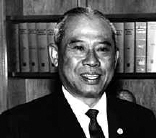| Thailand Table of Contents
Despite stern moves to suppress opposition, popular dissatisfaction with the dictatorial regime mounted in the universities and labor organizations as well as among rival military factions. The discontent focused on United States support for Thanom, the growth of Japanese economic influence, and the official corruption that the regime made no effort to conceal. The civilian political elite joined students and workers in opposing Thanom's apparent aim to perpetuate a political dynasty through his son, Narong, whose rise the officer corps particularly resented. Thanom's aggrandizement of his family was at odds with the image he tried to project and the standards of the "civic religion" with its call for veneration of "NationReligion -King." The triumvirate also ignored the king, who had moderated his earlier enthusiasm for Thanom, and opponents charged that the junta disregarded religion. Some critics detected signs of republicanism in the regime and feared another Thanom-sponsored coup to overthrow the monarchy. 
Custom Search
Source: U.S. Library of Congress |
 In November 1971, Prime Minister Thanom executed a coup against his
own government, thereby ending the three-year experiment with what had
passed for parliamentary democracy. The 1968 constitution was suspended,
political parties banned, and undisguised military rule imposed on the
country. Under the new regime, executive and legislative authority was
held by a military junta, the National Executive Council. Heading the
council was a triumvirate that included Thanom, who retained the office
of prime minister; Field Marshal Praphat Charusathian, his deputy prime
minister; and Thanom's son (also Praphat's son-in- law), Narong
Kittikachorn, an army colonel.
In November 1971, Prime Minister Thanom executed a coup against his
own government, thereby ending the three-year experiment with what had
passed for parliamentary democracy. The 1968 constitution was suspended,
political parties banned, and undisguised military rule imposed on the
country. Under the new regime, executive and legislative authority was
held by a military junta, the National Executive Council. Heading the
council was a triumvirate that included Thanom, who retained the office
of prime minister; Field Marshal Praphat Charusathian, his deputy prime
minister; and Thanom's son (also Praphat's son-in- law), Narong
Kittikachorn, an army colonel.